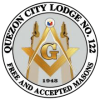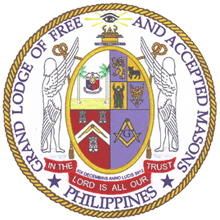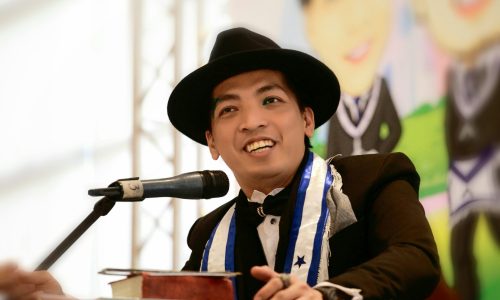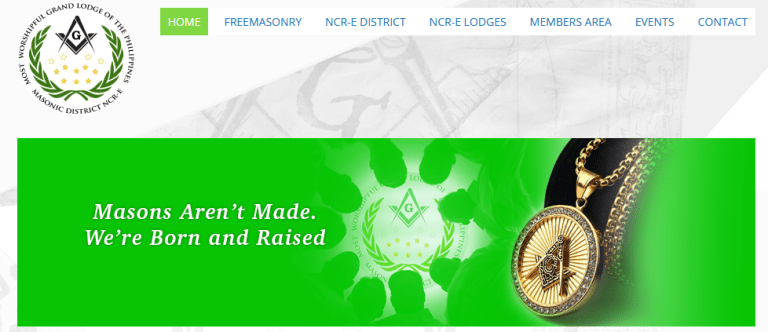We Masons live in one of the most challenging periods this Grand Jurisdiction have ever experienced and truly a time to test the mettle of each one of us. We are confronted today with monumental problems concerning our integrity as an Institution. I need not go into details on the events that un-fold before our eyes. There are many problems besetting our Institution that unfortunately and regrettably originate from within. People always have a way to live and decide the course of their own destiny and the same is true with us, Masons. The signs are disturbing. I recall an article published in one of the issues of The Far Eastern Freemason several years ago and I quote –
“When you place your hand in a flowing stream, you touch the last that has gone before and the first that is yet to come. A man’s relevant position in history and our position in Freemasonry is that hand. We stand today as the hand in the flowing stream of Freemasonry touching the last that has gone before and the first that is yet to come. There is a distinctive difference, however, between the hand in the water and us. The hand has no power to change the ultimate destiny of the flow of the water. But we, my Brethren, have the capacity and the power to change the ultimate destiny of Freemasonry.” End of quote.
It is for this reason that I will focus on the subject of self-development and improvement in Masonry for I believe that this will chart the course of our destiny as Masons.
The purpose of Freemasonry is “self-improvement” – not in the material sense, but in the intellectual, moral, and philosophic sense of developing the whole persona and psyche of an individual mason. Such are the lofty, lawful, and laudable aspirations of our Order.
Much has been said and written about Freemasonry that most of us are lost in the midst of confusion as to its real meaning and purpose. Masonry is not something that can be handed to the candidate for a material or tangible consideration. His real Masonry must come to him from the development of the faculties which are inherent to him. We should not make masonry too easily obtainable and retainable. The doctrines of the craft he interprets for himself; its teachings he must learn mainly through his own experience. Masonry cannot teach; it can only point the way. Each must, by his own study and contemplation, decide what it means to him. Each of us has a duty to assist in this great work. We should not welcome to our fold less than what is the standard requirement for membership. For “The minute you settle for less than you deserve, you get even less than you settled for.” He must be ever mindful that Freemasonry is a mystery that must be searched, discovered, and plumbed throughout one’s life; that it is not just a fraternity for social and fellowship purposes; that it is a school in which one can unravel the mysteries of life and existence; and lastly, it “supplies a need to those who are earnestly enquiring into the purpose and destiny of human life”.
While we adhere to the truism, that genuine masonry to be lived at its highest and best, it must be influenced in some measure by the lives of other masons and that the “lives of great men all remind us that we too can make our lives sublime, and departing, leave behind us footprints on the sands of time”. I must submit the thesis that while the influence of learned masons is a factor in the development of any mason for that matter, it is better that the individual mason must strive to improve himself in masonry. While we enjoy the fellowship of masons every now and then in order to keep alive our faith in the truths that masonry teaches; work together in the service of humanity and educate the public of what masonry is all about, in the end I still believe that the development in masonry is primarily and fundamentally an individual effort.
“We become Masons only when we learn to live outside the Lodge the lessons we learned within. Masonry must become more than an organization for us – it must become a way of life!”
One of the more important means of self-improvement in Masonry is faithful attendance at our Lodge meetings. The strength of our Lodges depends upon our attendance and upon our personal contribution to their welfare and progress. When we meet together at the Altar of Prayer, the various ceremonies we witness will keep alive our faith in Masonry. If you listen carefully and intently and in the right attitude, the various ceremonies of degree work teach a plentitude of great and important truths couched in classic language which impress and inspire us deep inside. But just how many of us appreciate and conduct ourselves during this solemn Rites and absorb it as part of our self improvement and development?
Sadly enough, as one Brother Mason aptly said –
“Some Lodges have the practice of taking in too many men who do not have the mental and spiritual capacity to be Masons except in name only. These men make little or no contribution to Masonry, and Masonry can make little or no contribution to them.”
On another front, some brethren have the funny and absurd notion that Masonry owes them a lot. They love to recall the long years of their membership, the amount of money and time they have expended, the different positions they occupied, the assistance they have given to their brethren and fellowmen, all in the name of Masonry. They count and measure the titles and honors they received. But have they done enough for masonry and so much of masonry in themselves? As correctly posited, “How much is much? How much is enough?” Frankly, what you and I have done for Masonry cannot be measured and quantified by the material things we have given for everything we have done cannot be enough.
MW Joseph Seltzer, Past Grand Master of the Grand Lodge of Minnesota was right when he said and I quote:
“I owe a lot to Masonry. No matter how much I try to do for my Lodge or my Grand Lodge, I always come to realize that I have not done, neither can I do, enough for Masonry.” End of quote.
Brethren, the Craft does not write out its lessons in great letters for all to see. It conceals them in symbol and allegory. Symbolism and allegory are a language that is old and universal. It is always alive. It sets the mind free and hopefully makes every man think for himself. In this manner we hope to learn the TRUTH, which none of us may learn from another and no one may learn alone. To draw
aside the veil from these symbols and allegories is Masonic Work, and he who applies the working tools of his trade to this purpose will receive great reward.
The real secret of Masonry, therefore, is an experience which only the members of the fraternity have voluntarily undergone. The Mystic-tie is their expression for this experience of Masonic Brotherhood. As Dr. Joseph Fort Newton once wrote:
“The secret of Masonry, like the secret of life, can be known only by those who seek it, serve it, live it. It cannot be uttered; it can only be felt and acted. It is, in fact, an open secret, and each man knows it according to his quest and capacity. Like all things most worth knowing, no one can know it for another and no one can know it alone. It is known only in fellowship, by the touch of life upon life, spirit upon spirit, knee to knee, breast to breast, hand to hand.”
You and I are only a face in the crowd of millions of Masons in the world and for hundred of years, millions of them have come this way before and had done their bit for Masonry. Their blood flooded the dry lands of the earth and fertilized this planet for a purpose – to set the course of the civilization of mankind so that none may be ignorant of false beliefs and every one be enlightened to understand his well-being! Their names are etched indelibly upon headstones of eternity – names never to be forgotten until time shall be no more! Without Freemasonry the civilized world, in its present form, probably would not have existed. The world is as it is today because Freemasonry charted on the trestle-board its destiny. Our beloved country was not spared of the universal influence of Freemasonry that all of us Masons are very much aware of. And for those who are not, let alone the names of our heroes and what they have done for this country speak for themselves. Suffice it to state that almost if not all of them were Masons! Only those who refused to accept the contribution of Freemasonry in the evolution of mankind and most especially in the history of the Philippines will forever be ignorant and at a perpetual distance to historical reality. Let us do a little bit more for Masonry in our Lodge, our Grand Lodge, or in the world, but let us, please, do a little more for Masonry in ourselves. This is the kind of self-development in Masonry that will make us realize that after all, no matter how small our contribution might be, it will count toward something big in the end. Big enough to make us proud to be called Masons! The wise admonition of Bro. A. C. Green, a Masonic Historian should be a grim reminder when he said this – “ There used to be a time when it meant something to be a mason, it showed a level of class.”
Another factor in self-improvement is increasing one’s Masonic literacy and proficiency. The greatest thing in life is the power and the passion to learn and grow. Some of us, I am sorry to state depend on The Cabletow or The Far Eastern Freemason for our Masonic literacy and education. Worse, most masons do not even bother to read them. While it does give Masonic Information we should, however, go further and travel through the pages of history and read Masonic books and publications the better for us to increase our knowledge in things Masonic. You can surf the Internet for information about masonry and you will be surprised to discover the enormity of Masonic materials available at the tip of your finger. In fact, there are even Grand Lodges in other jurisdictions that have an Academy for Masonic Knowledge and have established their own website for Masonic Education. They provide a well rounded educational program for the study of Masonry. In the process they instill deeper respect for the Institution and consequently more serious observance of its Ancient Landmarks and Charges. The Grand Lodge of Pennsylvania, for one and especially its Masonic Library has an array of thousands of Masonic Books written by Masonic Scholars and has in its possession books in Freemasonry written and published in the 14th century; it has established its own Academy for Masonic Knowledge and all masons interested can enroll in their program. The Masonic Information Center, the information arm of the Masonic Service Association of North America publishes, among others, the Short Talk Bulletin and the Emessay Notes, all relating to Masonry for public consumption; The Quator Coronati Lodge No. 2076 in London chartered on November 28, 1884 is the premier Lodge of Research of the world, also has a collection of Masonic Publications that is open for those who are willing to learn more about the Craft and satisfy their curiosity; The Philalethes Society, an exclusive Club of Masonic Scholars and Writers based in Highland Springs, Virginia, U.S.A., also provides us with several published articles, research works and essays on Freemasonry and the depth of knowledge acquired through the ages by these individuals gives us a better understanding of Freemasonry’s origin and its development. Additionally, and this is very interesting for all of us to know that in the United Kingdom, there is an Educational Charitable Trust known as CANONBURY MASONIC RESEARCH CENTRE (CMRC for short). The CMRC was set up by Lord and Lady Northampton partly in order to bridge the gap between historical research into freemasonry performed by freemasons and that of non-masonic academics. Each year it has held an international conference and published papers in freemasonry.
The trustees of this CMRC are RW Lord Northampton, Asst. Grand Master of the UGLE; VW James W. Daniel, Grand Secretary; and WB Michael Baigent, the well known Author of The Holy Blood, Holy Grail; The Temple and the Lodge;
The Messianic Legacy and many others. It is unfortunate that WB Michael Baigent met his creator on June 17, 2013 after a long lingering brain hemorrhage. Bro. Michael’s interest in the history of ideas and esoteric tradition led him to the craft, becoming a freemason in the lodge of Economy No. 76, in Winchester, England and later joined the Prince of Wales Lodge No 259 in London.
The 11th International Conference held in Canonbury Academy in Islington, England, on April 19, 2009, and organized by Prof. Mathew Scanlan, centered on masonic origins. During the conference, Professor Andrew Prescott of University of Wales made this opening pronouncement: “There is no fixed origin of Freemasonry…there are no unchanging landmarks in Freemasonry. Like all historical phenomena, it has no origin.” There are different theories with respect to the origin of Masonry. Some say that Masonry began in the dim light of the almost forgotten past and had its beginnings at the time of the Greek Philosopher Pythagoras, some five hundred years before Christ. Others advanced the view that freemasonry is directly connected with mystery schools. There are those who trace its history in the secret societies of the middle ages. Some learned theorists insist that since the fundamental principle of Freemasonry is a belief in God as the dispenser of good and the Supreme Architect of Heaven and Earth, there is no doubt that freemasonry can trace its beginnings from the creation, a Divine Providence directing the destiny of man, both in the spiritual and secular domain. These theories enliven our interests in our institution.
A well respected Masonic Historian and Jesuit Priest Jose Antonio Ferrer Benimeli, the founding Director of Centro de Estudios Historicos de la Masoneria Española at the University of Zaragoza, Spain submitted in the same conference a paper concerning the religious origins of freemasonry. His paper on Las Logias del Grande Oriente Español (1900-1936) and Implantacion de Logias y Distribucion Geografica-Historica de La Masoneria under the Grande Oriente Español and Grande de España in 1865-1899 gave us a glimpse of the geographical location of the early triangles and lodges that operated in the Philippines during the period and became the source of my information in writing about the early origins of the Lodges and Triangles that operated in the province of Quezon.
At the University of Sheffield in England, a project is underway to create a Chair of Masonic Studies and to establish a curriculum leading to a Doctorate Degree. The library of the UGLE has been made available to the students of CMRC and University of Sheffield. The Provincial Grand Master of the Masonic Province of Yorkshire, West Riding, RW J. Trevor Broadley is spearheading the work for the establishment of the Chair of Masonic Studies in said University.
Our own Grand Lodge has its Institute for Masonic Education and Studies (IMES) and the Philippine Lodge of Research. They conduct regular lectures and seminars for those who are interested to learn more about the workings of the Grand Lodge, the subordinate Lodges in particular and Masonry in general. Indeed, the field of study and interest of Freemasonry is very extensive and its scope is limitless that only by diligent, honest, courageous, and persistent efforts at serious study may the individual mason acquire a fairly good working knowledge.
It covers practically the entire gamut of the study of man; his nature, origins and behavior; and the problems that beset the development, growth, and ultimate destiny of mankind. The interest and curiosity of the public about masonry has even been recently and tremendously exacerbated by the advent of several publications, books and films that depicts Masonic influence in civilization and religion. We as masons cannot just sit and watch this rapid change in the awareness and attitude of people including our families towards Freemasonry unless we ourselves start to re-examine our own Masonry. Perhaps, we should take time and analyze what we have accomplished and honestly rectify and acknowledge where we have failed. The President of the IMES, RW Fernando V. Pascua, Jr., is correct when he said so eloquently his own observation –
“That many men who are taken into the Lodge never go beyond the degree of proficiency and literacy. They are not mentally alert and curious enough to want to know and discover more about Masonry and many of them end up losing all interest in the Lodge and its work, and while they continue to pay dues for reasons that seem good to them, they are still Masons in name and convenience only….Masonry today has too many members who are not Masons, because the work of too many lodges is not Masonry. If lodge-work was more faithfully and thoughtfully done, if more attention was given to the study of our symbols, and less to mere show and ‘harmonies’, the number of our petitioners might be less, but the number of real masons in the world would be greater. Many of our beautiful symbols are scarcely ever heard in our lodge, and only a few of our members have studied them, and learned the truths they contain.”
My brethren, self-improvement and development in Masonry more than ever, should start with each individual mason and it behooves upon us to continuously educate ourselves in Masonry. Let us strive more earnestly to understand the meaning of our rites and ceremonies; search more diligently for the meaning of our symbols and allegories; and more faithfully exemplify Masonry in our lives by the practice of every commendable virtue. When we have taken up this work in earnest and with a dynamic conquering spirit, and when the new brethren coming into our lodge shall come duly and truly prepared, worthy and well-qualified, I believe that we shall find within our walls such joy and enthusiasm in the search for truth as we have never before known.
There are too many drones in the Masonic hive, whose negligence is only surpassed by their ignorance. They have passed through all the degrees, but never visit their Lodges. They howl once a year, when they pay their dues to the secretary, otherwise they do not disturb the harmony of the Craft. They look upon Masonry as a popular Order, but should a storm arise and its popularity be shaken, these men would be the first to leave the ship. Then they would declare that they never had a good opinion of it. Such hypocrites are always ignorant men, and their ignorance is a crime in Masonry.
This is the challenge that confronts us today and I will cast my lot to the newly Installed Officers of Quezon City Lodge No. 122, for them to formulate a well-meaning program for self-improvement and development in Masonry for after all you have the capacity and power to change the ultimate destiny of freemasonry in this Lodge. With Worshipful Master Waldruss R. Frondoza, at the helm, I am confident that he will lead his Lodge and Masonry to its ideal place of building temples in the hearts of men and where the desire to excel prevails your lodge’ commitment to excellence.
The personal musings of R.W. Bro. Michael W. Walker, Grand Secretary, Grand Lodge of Ireland, is in order, to wit:
“But remember, brethren, as we enter and endure “the winter of our discontent” we must maintain our standards and our dignity. There can be no compromise with quality in any facet of our institution. Let us hold firm to the symbolism of the square and the compasses and let them be the means of restoring “Ordo ab Chao” – order out of mental and moral chaos – as we strive to readjust emotionally to the crushing pressures and stress of modern life. “
Now brethren, let me close on one final exhortation –
“With faith in man, hope for the future of humanity, loving-kindness for our fellows, Masonry and the Mason must always work and teach. Let each do that for which he is best fitted”
Almost the whole Masonic ethos can be found in those few words – so easy to remember, so difficult to put into practice.
Thank you and good afternoon/evening!




